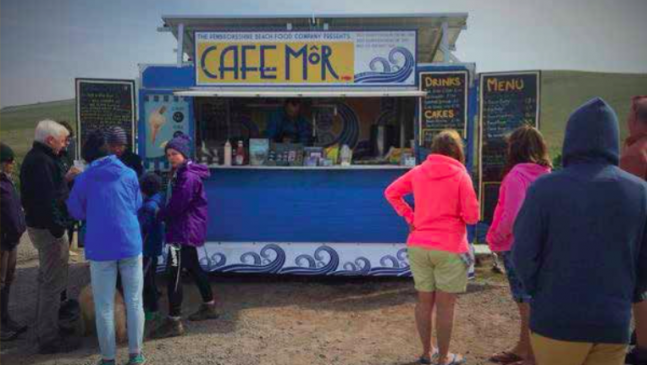Cafe Mor: A revolutionary off-grid catering concession
Pembrokeshire Beachfood has traded at Freshwater West Beach since 2013, a site that is managed by the National Park and the National Trust. Their Cafe Môr trailer offers a range of high quality food inspired by West Wales produce. In March 2015, they won a Sustainable Development Fund (SDF) support from Pembrokeshire National Park Authority to test out an approach that could revolutionise the catering concessions industry and significantly reduce greenhouse gas emissions (GHGs).
Their remote site had no grid connection and, until the start of the project, electrical power was provided by a generator during the day and a hook up at a local farm by night. The SDF support was used to part fund the installation of solar PV panels and a small wind turbine, along with a solar inverter and a battery bank. The system removed the need for a noisy, carbon-fuelled petrol generator by day, and reduced electrical demand at night (with mains electricity used to top up the batteries if required, rather than being the sole source of power at night).
Instant benefits to the business included a reduction in generator noise, less staff time required for generator operation and maintenance, fewer trading days lost due to generator issues and increased power security as a result of having a battery back up. In the longer term the new system will also considerably reduce operation costs: in 2014, Cafe Môr used around 1000 litres of petrol to fuel the generator, which cost around £1,300. Assuming the system is optimised to minimise mains battery charging to almost zero, benefits in terms of reduced petrol consumption, reduced staff time and reduced loss of trading could be in the region of £2,500 per year: the Cafe Môr system cost just £7,500, so this would give a payback time of around 3 years.
Payback times for systems mounted on vans or trailers used regularly at events could be even better. Initial indications based on a system with three days battery life plus wind or solar recharge, during an event of 7-10 days and assuming an electricity hook-up cost of £450+VAT per event, with 10 events per year, would mean the system would pay for itself in less than 2 years on a system costing up to £9000.
Of course this is not just about money — there is significant potential for the industry as a whole to reduce their impact on the environment, and particularly GHGs. 1000 litres of petrol is equivalent to 2.33 tonnes of GHGs per year. Scaled up across the industry of 10,000 units this amounts to a potential saving of 20,000 tonnes CO2e/yr.
The next stage of the project will monitor the electricity generated by the system to establish exactly how much the system generates and therefore how much mains charging is required, and future phases of the project will look at options for reducing the impact of LPG and vehicle fuel.
Thanks to The Pembrokeshire Beach Food Company and The Nationwide Caterers Association for providing the information for this case study.

